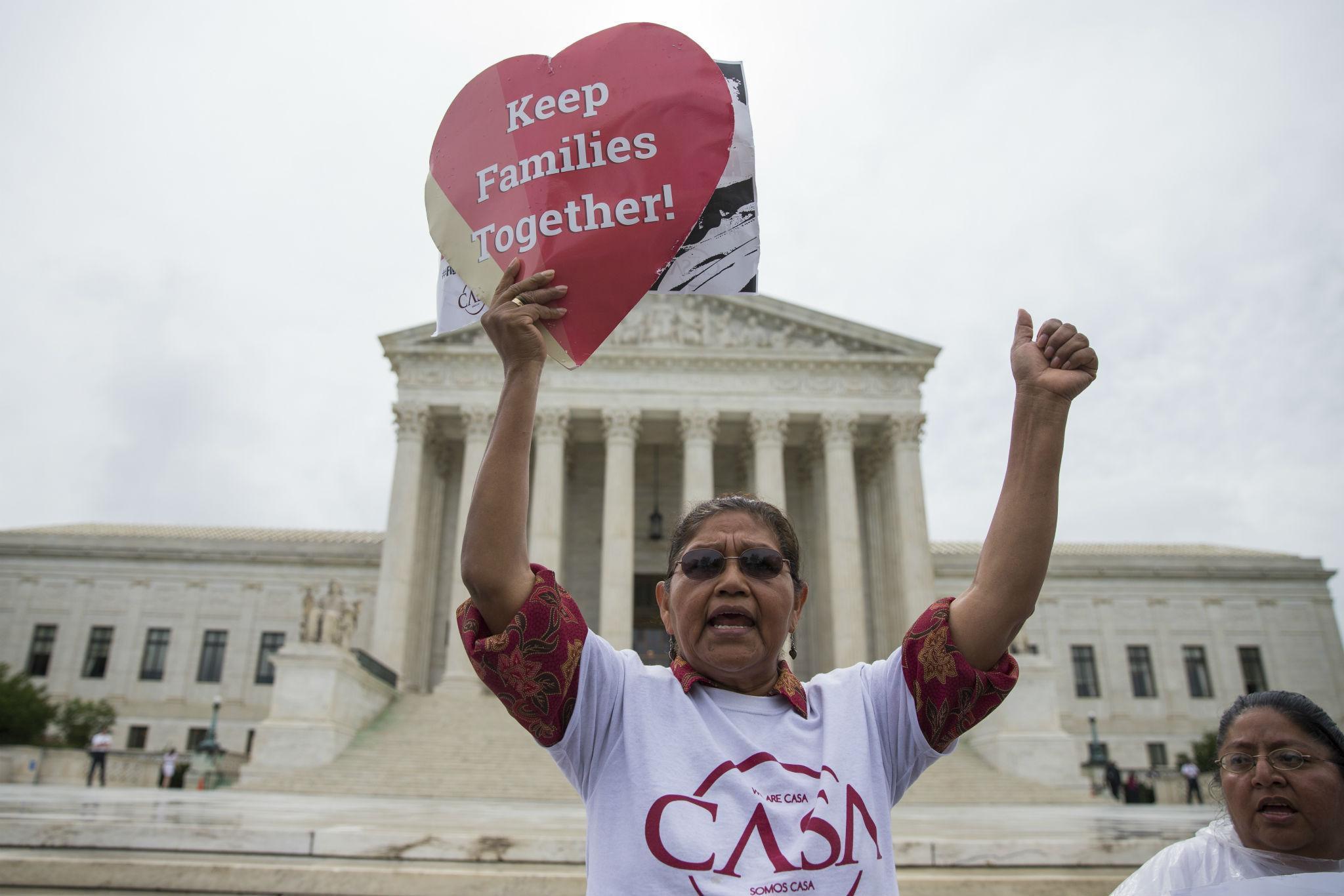Supreme Court immigration policy ruling: What has been decided and what happens next?
And does this spell the end of President Obama’s attempts at immigration reform?

I hear the Supreme Court issued a ruling on immigration policy.
Well, sort of. The US Supreme Court, known to its friends as SCOTUS, was asked to rule on President Obama’s plan to lift the threat of deportation from more than 4 million undocumented immigrants living in the US. But the eight justices on the court announced on Thursday that were deadlocked in a 4-4 tie and could not reach a majority decision.
Mr Obama unveiled his executive action plan, Deferred Action for Parents of Americans and Lawful Permanent Residents (DAPA), in November 2014. But last year Texas and 25 other states sued to prevent the programme being implemented, claiming that the President had overstepped his executive authority.
A US District Court judge in Texas issued a preliminary injunction that stopped the plan taking effect nationwide. His decision was upheld by the 5th Circuit Court of Appeals before reaching the Supreme Court. The 4-4 SCOTUS tie leaves the injunction in place, and effectively scuppers the Obama administration’s most ambitious attempt to reform immigration policy.
What exactly is the DAPA programme, anyway?
DAPA would have allowed the undocumented parents of US-born children (or children who are official US residents) to stay in the country for three years and apply for work authorisation, provided they had already been here for five years or more and had no criminal record. They could then pay taxes and receive some government benefits.
The plan would have helped around 4 million of the estimated 11 million undocumented immigrants living in the US to emerge from the shadows. Mr Obama chose to take executive action after Congress failed dismally to enact anything resembling the comprehensive immigration reform that both major political parties agree is long overdue.
Sounds like bad news for the White House.
And even worse news for the undocumented. Mr Obama’s biggest success on immigration was his 2012 Deferred Action for Childhood Arrivals (DACA) programme, which shielded from deportation some 700,000 undocumented immigrants who had arrived in the US as children. But for many immigration activists, the President will be remembered as the “Deporter-in-Chief”, who has deported more than 2 million immigrants since taking office in 2009.
Speaking to reporters after the Supreme Court (non-)ruling was announced, Mr Obama said the decision "takes us further from the country we aspire to be." He went on: “We're going to have to decide whether we're a people who accept the cruelty of ripping children from their parents' arms, or whether we actually value families and keep them together for the sake of all of our communities.”
Wouldn’t SCOTUS find it easier to reach decisions if there were, say, one more justice to break a deadlock?
Yup, they sure would. The court normally has nine members, thus avoiding situations just like this one. But when Justice Antonin Scalia died in February, he left SCOTUS evenly split between four conservative justices and four liberal or moderate justices. There have been three other tie rulings already this year for that very reason.
Mr Obama has nominated a replacement for Justice Scalia: Judge Merrick Garland, who sits on the US Court of Appeals for the influential District of Columbia Circuit and is thought to be a political moderate. However, the Republicans who control the Senate – and thus the Supreme Court confirmation process – have refused to hold hearings on any nominee until after Mr Obama leaves the Oval Office.
So what happens next?
The case will be bumped back to Texas, where the federal courts that blocked DAPA will undoubtedly ratify their own decision. That probably delays any prospect for immigration reform until after the presidential election.
Hillary Clinton, the presumptive Democratic nominee, said the SCOTUS decision was “heartbreaking”. She has vowed, if she wins in November, to broaden protections for the undocumented even further than Mr Obama. And if Mr Trump wins… Well, we all know how he feels about immigrants.
One reason why senior Republicans are falling into line behind the property mogul, in spite of his xenophobic rhetoric, is their fear of conservatives losing control of the Supreme Court for years to come.
Three of the eight remaining justices will be 80 or over by the time the next President takes office. If any of them retires under a Clinton administration, their replacements could create a liberal-leaning SCOTUS for the foreseeable future. For all his faults, Mr Trump would be the warm body Republicans need in the White House to nominate conservative justices.
Subscribe to Independent Premium to bookmark this article
Want to bookmark your favourite articles and stories to read or reference later? Start your Independent Premium subscription today.

Join our commenting forum
Join thought-provoking conversations, follow other Independent readers and see their replies